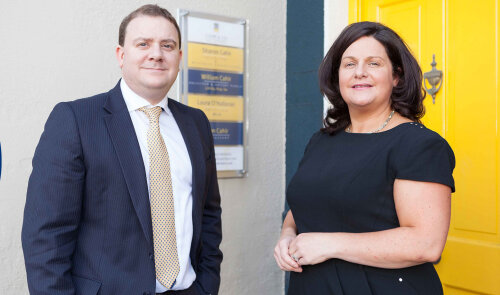Best Brain Injury Lawyers in Ennis
Share your needs with us, get contacted by law firms.
Free. Takes 2 min.
List of the best lawyers in Ennis, Ireland
About Brain Injury Law in Ennis, Ireland
Brain injury law covers the legal issues that arise when a person suffers a head injury that causes harm to their brain. In Ennis, a town in County Clare, legal matters related to brain injury follow the same national Irish laws and procedures that apply across the State, while local services and supports are provided through regional health and social care networks. Brain injuries can be traumatic - for example from road traffic collisions, falls or assaults - or non-traumatic - for example from strokes, oxygen deprivation or infections. The legal work often involves establishing liability, proving the extent of injury and loss, and securing compensation and funding for medical care, rehabilitation and long-term support.
Why You May Need a Lawyer
A specialist solicitor can be essential when dealing with brain injury cases because these matters are legally and medically complex. You may need a lawyer if any of the following apply:
- You sustained a brain injury because of someone else’s negligence - for example in a road traffic accident, workplace incident or slipping on unsafe premises.
- Your injury arose from alleged medical or clinical negligence during diagnosis, treatment or aftercare.
- You need help securing funding for immediate and long-term rehabilitation, care and adaptations to your home.
- There are disputes about liability, or insurers deny or undervalue your claim.
- You, or a family member, lack capacity to make legal or financial decisions and you need advice about guardianship, wardship or other protective arrangements.
- You require interim payments to cover urgent medical bills, therapy or rehabilitation while a claim is ongoing.
In short, a solicitor with experience in brain injury and personal injury law can advise on evidence, medical records, the claims process, negotiations with insurers, court procedures, and how best to fund and structure any award to meet long-term needs.
Local Laws Overview
Key legal elements relevant to brain injury cases in Ennis include the following:
- Personal Injury Claims and the Injuries Board - Many accident-related personal injury claims in Ireland are routed through the Injuries Board (often called PIAB). Claimants may be required to apply for an assessment before commencing court proceedings. There are exceptions and deadlines, so early legal advice is important.
- Limitation Periods - The general statute of limitations for personal injury claims is two years from the date of the injury or from the date the injured person became aware of the injury. Special rules apply to children, people with capacity issues and some other circumstances.
- Duty of Care and Negligence - To establish liability you typically need to show that a defendant owed a duty of care, breached that duty and that the breach caused the injury and resulting losses.
- Medical Negligence - Claims against health professionals or hospitals follow principles of clinical negligence law and are often more legally and medically complex. These claims can involve different procedural approaches and expert evidence.
- Compensation Types - Awards may include general damages for pain and suffering, special damages for past financial losses, and future losses such as diminished earning capacity, cost of future care, ongoing therapy, equipment and home adaptations.
- Capacity and Decision-Making - Where the injured person lacks capacity to make financial or legal decisions, there are legal mechanisms in Ireland such as the Wards of Court system and other protective measures. The Assisted Decision-Making (Capacity) Act provides a modern framework for decision-making assistance and supports, though particular provisions and processes may vary.
- Courts and Appeals - If settlement is not possible, cases may progress to court. The Circuit Court, High Court and Supreme Court handle personal injury and medical negligence litigation depending on the value and complexity of the case. Judges may hear appeals from decisions of the Injuries Board.
- Social Welfare and Health Entitlements - Injured persons may be entitled to State supports such as disability payments, health services and rehabilitation through the Health Service Executive. These entitlements are separate from civil claims for compensation but are important to consider when planning care and finances.
Frequently Asked Questions
What should I do immediately after a brain injury?
Seek immediate medical attention and follow clinical advice. As soon as practical, record what happened while details are fresh - take photos, note witness names and contact details, and preserve any relevant physical evidence. Notify your insurance company if the incident involves a vehicle or workplace. Seek legal advice early, particularly if you suspect someone else is at fault.
How long do I have to bring a claim for a brain injury?
The usual limitation period for personal injury claims in Ireland is two years from the date of injury or from the date you became aware of the injury. Different rules can apply to children and those who lack capacity. Because time limits can bar a claim, contact a solicitor promptly to check deadlines that apply to your situation.
Do I have to go to the Injuries Board before going to court?
Many personal injury claims are subject to an Injuries Board assessment process before court proceedings can be issued, but there are exceptions. The rules can be technical, and some complex or clinical negligence cases may follow different paths. A solicitor can advise whether the Injuries Board process applies to your case and how to comply with procedural requirements.
What types of compensation can I claim for a brain injury?
Compensation can include general damages for pain and suffering, special damages for past financial losses, and future damages for loss of earnings, cost of future care, ongoing therapy, assistive equipment, and home adaptations. In severe cases, awards are designed to provide for long-term care and rehabilitation needs.
How do you prove liability in a brain injury case?
You need to show that the defendant owed a duty of care, breached that duty, and that the breach caused the brain injury and losses. Medical records, witness statements, expert reports from neurologists, neuropsychologists and rehabilitation specialists, accident reports and any CCTV or photographic evidence are commonly used to establish causation and the extent of injury.
What if the injured person cannot make legal decisions?
If the injured person lacks capacity, family members should seek specialist legal advice about protective arrangements. Options include the Wards of Court system, court-appointed deputies, or arrangements under the Assisted Decision-Making framework where appropriate. A solicitor can advise on how to obtain authority to pursue claims and manage compensation for the person’s benefit.
How are medical negligence claims for brain injury different?
Medical negligence claims often require detailed clinical evidence and specialist expert reports to establish that the care fell below the accepted standard and that this caused or worsened the brain injury. These claims can be more complicated to prepare and may take longer to resolve. Early review by a clinical negligence solicitor is advisable.
Will a solicitor work on a no-win-no-fee basis?
Some solicitors offer conditional fee agreements or other fee arrangements, but availability and terms vary. Always get clear written information about fees, costs, and whether you may be liable for the other side’s costs if you lose. Discuss funding options and the solicitor’s track record in brain injury cases before engaging them.
Can I get interim payments for immediate care and rehabilitation?
Yes, in appropriate cases a solicitor can seek interim or periodical payments from an insurer or from court to cover urgent medical treatment, rehabilitation or care while the overall claim is being resolved. These applications require evidence of need and a credible claim for ongoing damages.
Where can I find specialist brain injury legal help in Ennis?
Look for solicitors who specialise in personal injury and clinical negligence and who have experience with brain injury cases. Ask about their experience with complex medical evidence, rehabilitation funding, and arrangements for long-term awards. Local solicitors’ practices in Ennis may collaborate with national experts and medical specialists to prepare a strong claim.
Additional Resources
Useful organisations and bodies for people with brain injury in Ennis include:
- Health Service Executive - for regional health services, assessment and rehabilitation support.
- Injuries Board - for personal injury assessment and procedures.
- Citizens Information - for general legal and welfare advice, including social welfare entitlements and disability supports.
- Legal Aid Board - for information on access to legal aid in civil matters where it may apply.
- Headway Ireland and local brain injury support groups - for rehabilitation information, peer support and practical advice about daily living after brain injury.
- Department of Social Protection - for information on disability payments and social welfare entitlements.
- Local solicitors in Ennis with expertise in personal injury and clinical negligence - for specialist legal advice and case management.
- Wards of Court Office - for information if a person lacks capacity and protective orders or management of affairs are required.
Next Steps
If you or a loved one has suffered a brain injury and you think you need legal help, follow these practical steps:
- Get medical care first and ensure the injury is properly documented in medical records.
- Preserve evidence - keep medical reports, receipts for expenses, photos of the scene and contact details for witnesses.
- Make notes about how the injury affects daily life, work capacity and personal needs - include dates and specifics.
- Contact a solicitor experienced in brain injury, personal injury or clinical negligence. Ask about their experience, fee arrangements and how they handle rehabilitation planning and interim payments.
- If the injured person lacks capacity, mention this when you contact a solicitor so you can receive guidance on necessary protective steps such as guardianship or the Wards of Court process.
- Explore supports from local health and community services for immediate rehabilitation and social welfare entitlements while legal matters proceed.
Early action helps protect legal rights, preserve vital evidence and improve the chances of securing appropriate compensation to meet medical, rehabilitation and long-term care needs. A specialist solicitor can guide you through each stage, from initial assessment and negotiations to court proceedings if required, and help plan for future financial security and practical supports.
Lawzana helps you find the best lawyers and law firms in Ennis through a curated and pre-screened list of qualified legal professionals. Our platform offers rankings and detailed profiles of attorneys and law firms, allowing you to compare based on practice areas, including Brain Injury, experience, and client feedback.
Each profile includes a description of the firm's areas of practice, client reviews, team members and partners, year of establishment, spoken languages, office locations, contact information, social media presence, and any published articles or resources. Most firms on our platform speak English and are experienced in both local and international legal matters.
Get a quote from top-rated law firms in Ennis, Ireland — quickly, securely, and without unnecessary hassle.
Disclaimer:
The information provided on this page is for general informational purposes only and does not constitute legal advice. While we strive to ensure the accuracy and relevance of the content, legal information may change over time, and interpretations of the law can vary. You should always consult with a qualified legal professional for advice specific to your situation.
We disclaim all liability for actions taken or not taken based on the content of this page. If you believe any information is incorrect or outdated, please contact us, and we will review and update it where appropriate.










